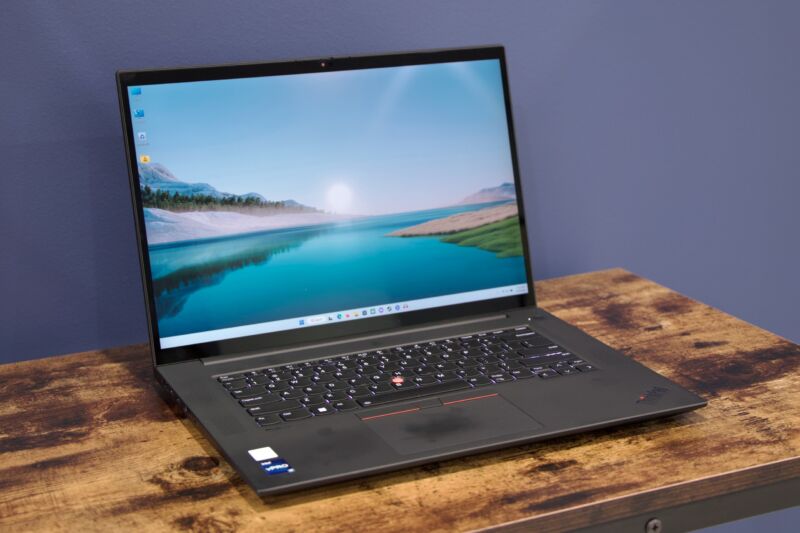
Enlarge / Lenovo's ThinkPad X1 Extreme Gen 5. (credit: Andrew Cunningham)
| Specs at a glance: Lenovo ThinkPad X1 Extreme Gen 5 (As reviewed) | |
|---|---|
| Display | 16-inch 3840×2400 IPS touchscreen (283 PPI) |
| OS | Windows 11 Pro |
| CPU | Intel Core i7-12800H (six P-cores, eight E-cores) |
| RAM | 16GB 4,800 MHz DDR5 (2 DIMMs) |
| GPU | Nvidia GeForce RTX 3070 Ti (8GB, 100 W), Intel Iris Xe |
| Storage | 1TB NVMe SSD |
| Networking | Wi-Fi 6E (802.11ax), Bluetooth 5.3 |
| Battery | 90 WHr |
| Ports | 2x Thunderbolt 4, 2x 5Gbps USB-A, SD card reader, HDMI 2.1, headphones |
| Size | 13.57×9.06×0.17 inches (344.7×230.1×18.0 mm) |
| Weight | Starts at 4.14 pounds (1.88kg) |
| Warranty | 1 year |
| Price as reviewed | $3,280 from Lenovo |
Our take on the fifth-generation version of Lenovo’s ThinkPad X1 Extreme is—spoiler—pretty much the same as what we said about the fourth-generation version. It runs hot and it's expensive, but it’s powerful and arguably a better choice than Dell’s XPS 15 for people whose laptop is their primary computer rather than a sidecar for a desktop workstation or gaming PC, thanks to an expanded port selection and more powerful GPU options.
It also changes even less than is typical for a year-over-year laptop refresh, adding Intel’s 12th-generation Alder Lake CPUs but sticking to the same RTX 3000-series GPUs from Nvidia and similar memory and storage configurations. We’ll point you to last year’s review for extended commentary on the keyboard, ports, and general look and feel, which haven’t changed much year to year. It uses the typical comfortable Lenovo laptop keyboard plus the pointing nub and trackpad, all among the best you can get in a laptop from Lenovo, Dell, Apple, or any other company.
The X1 Extreme is also reasonably easy to upgrade and repair compared to thinner and lighter laptops, with easily accessible DDR5 RAM slots and a pair of M.2 SSD slots. In our review model, one had a 1TB SSD in it, and the other was open for upgrades. Lenovo still publishes a hardware maintenance manual (PDF) to help people perform those and other upgrades and repairs.
Read 13 remaining paragraphs | Comments
from Tech – Ars Technica https://ift.tt/5NJRen3
No comments:
Post a Comment